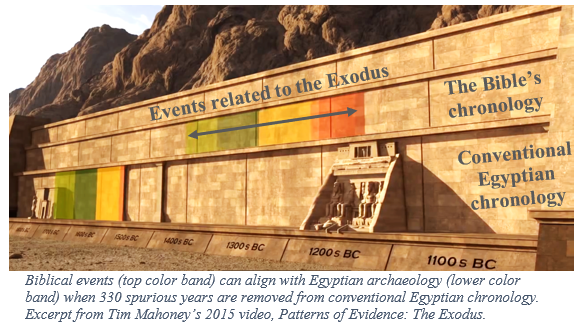In the Bible, God makes much of His role in human history, especially of the Israelites. Unbelieving academics professing themselves to be wise attack God by undermining the historical reliability and accuracy of the Bible. For instance, two respected archaeologists wrote: “… the emergence of early Israel was an outcome of the collapse of the Canaanite culture, not its cause. And most of the Israelites did not come from outside Canaan - they emerged from within it. There was no mass Exodus from Egypt. There was no violent conquest of Canaan. Most of the people who formed early Israel were local people -the same people whom we see in the highlands throughout the Bronze and Iron Ages.” [1]
This leads some to doubt the Bible’s veracity with a poisonous seed of unbelief: if the Bible is not right about history, whose artifacts we can see, why trust God in matters we cannot see? This pits the Bible against the scholar, and too often the latter wins over weak Christians.
Upon what do these scholars base their conclusions? It turns out their foundation hinges upon Egypt’s timeline of dynasties. Apparently, all Middle Eastern history is dated in reference to Egyptian chronology. How reliable is that? It turns out, not very. The only undisputed anchor date is when the Assyrian King Ashurbanipal sacked Thebes in 664 BC, but since 1971, researchers are finding big problems with the other anchor dates.
1 Kings 6:1 places the Exodus at 1446 BC. This date aligns with Israel’s period of the Judges, Jewish Sabbaticals and Jubilee calendar. It is, however, wildly out of sync with conventional Egyptian chronology, which has the Exodus occurring in the middle of the 18th Dynasty, where there’s no record of its society crippled by plagues and a destroyed army, let alone any foreign Jews conquering Canaanite cities 40 years later.
And this is where the half-baked Egyptian calendar begins to crumble. Why put the Exodus in the middle of a stable Egyptian dynasty? It turns out the Dynasty periods are derived from ancient authors citing Manetho’s list of kings, who wrote of them in the 3rd century BC some 1,200 years after the fact. Conventional Egyptologists have taken those Pharaohs and listed their reigns sequentially; but lately, it’s been discovered that many of them ruled at the same time over different areas. This error accounts for as much as a 330-year over-extension of Egypt’s history (see diagram below, bottom panel). When corrected and thus shortened, there is astounding Biblical alignment.

Christian filmmaker Tim Mahoney captured this new Egyptian chronology by Egyptologist David Rohl (a scholar, not a believer) in a must-watch film, Patterns of Evidence: The Exodus.[2] When Egypt’s history is corrected, we find stunning alignment between archaeology and the Bible, such as: the inexplicable demise of Egypt’s powerful 12th Dynasty; an abnormal number of graves with Semitic infant boys; numerous mass graves of all ages, indicative of the firstborn dead; a ruinous hiatus in Egyptian history afterwards; Jericho’s ruins of a collapsed wall and thick ash from a fire; and Gibeon and Hazor’s fiery destruction at the time of Joshua’s arrival. The evidence abounds; unbelieving archaeologists just ascribe it to the wrong period. Wait, this sounds a lot like evolution. We are not ignorant of his devices.
Though Rohl advocates other unbiblical ideas, his new chronology provides a scholarly option for Bible students. Yet all Christians should be as Titus, holding fast the faithful word as he hath been taught that he may be able by sound doctrine both to exhort and to convince the gainsayers. The Bible always wins in the final analysis.
[1] Source of blue quote and data: https://ancientexodus.com/the-date-of-the-exodus/
Like this? Consider sharing it to Facebook by clicking the linked icon below.
